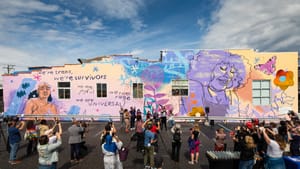Stay in the Loop
BSR publishes on a weekly schedule, with an email newsletter every Wednesday and Thursday morning. There’s no paywall, and subscribing is always free.
Philadelphia's first mural celebrating transgender people
Illustrating joy, queerness, and justice with Kah Yangni's mural We Are Universal

Murals have long served to beautify our environments while also illustrating and reflecting our portrayal of society, creating large-scale renderings from stories, values, and dreams. They’ve also served as mediums for social change, empowering and challenging us to question humanity’s intricacies while memorializing those who worked to change our society. Take the colorful and imaginative murals of Philadelphia artists Symone Salib or Nile Livingston or the many other muralists who depict Philadelphia’s vibrant communities creating monuments that remind us to think of what was and could be.
A historic addition
Adding to the coterie of the more than 4,000 murals in the city is We Are Universal, Philadelphia’s first mural celebrating transgender people by illustrator and muralist Kah Yangni. Covering 2,200 square feet on a 100-foot-long wall at Frankford Avenue and West Thompson Street in Fishtown, the mural features residents of Morris Home, the only residential recovery center in the US for trans and gender non-conforming people. The mural centers models Tazmere Stephens and Jourdyn Wood, both Morris Home residents, emblazoned around flowers, vines, and butterflies in shades of lilacs, pinks, peaches, and baby blues, and with crayonlike etched text that reads: “We’re trans, we’re survivors. We are joyful. We feel rage. We are Universal.” Buoyant, whimsical, and effervescent, the mural is hopeful and endearing without losing its nerve or urgency.
“Being trans is beautiful,” Yangni shared in an interview. ”I’m really proud of what I am and how far I’ve come, but I know that we live in a world where not everybody thinks that, and people in our community go through a lot. There’s a lot of darkness, but there’s also a lot of light, and I want to show that in my work.”
Finding community and inspiration
Yangni, 30, did not initially set out to become an artist. “I’m a child of immigrants. My parents are from Cameroon, so growing up, I was always expected to become a doctor, lawyer, or engineer, even though I loved to draw.” Yangni began making art as a child, first doodling with pencil and paper. “I was a very introverted and weird kid. We moved around a lot, so I found myself retreating into drawing to calm me down and make me feel better.”

Drawing stayed with them throughout adolescence and into college, where they fell into illustration. While in college, Yangni illustrated for the school’s newspaper and volunteered for a studio that had a printmaking workspace. “I learned how to screen-print because I wanted to develop my skillsets.” Graduating from Brown University in 2014 with a degree in American Studies, Yangni dove headfirst into making and learning to create art with various tools, honing their skills in screen-printing.
In 2017, they applied and got into Mural Arts’s internship program, a six-week paid program that taught basic mural-making techniques. “The program was really immersive, and I learned a great amount of insight into how to make a mural.” However, Yangni also found inspiration and a sense of community in Philadelphia. “Until then, I’ve never been to a city quite like Philadelphia before. Having grown up in mostly white neighborhoods, it was refreshing to be around many Black and queer folx,” they recalled. “I also never had seen artists have the lives they live and make the huge, large-scale art that they do.”
Heartfelt visions of queerness, love, and justice
Yangni has responded to the challenges of current events through their artwork, namely the pandemic, Black Lives Matter movement, and the call for protecting transgender lives. They were also part of the First 100 Days exhibition, a project that engaged Philadelphia residents around policy issues addressed in the new presidential administration. Crafting visual confections that they dub as “heartfelt neon visions of queerness, love, and justice,” their aesthetic consists of luminous and pastel hues with empowered slogans. When asked how they came to center these themes in their work, Yangni mentions that though their artistic aesthetic has always been meditative and calming, they felt encouraged to explore social justice themes in their work following the election of former president Donald Trump. “It awakened me, like so many, to how racism, xenophobia, homophobia, and transphobia are propagated. I felt like I needed to have more to say in my work.”
In so doing, they also wanted to put a positive spin on hard subjects. They recall creating a poster for Trans Day of Resilience, an art project that functions as a love offering to trans people of color everywhere that coincides with Trans Day of Remembrance. Working with Forward Together, which hires transgender artists to make graphics that can be shared about the resilience of trans people, Yangni has created imaginative works with text that read “Trans people exist in the future,” among other titles. “As a trans person, my journey to who I am has given me a lot of freedom and happiness,” Yangni shared. “Yes, we’re faced with heavy challenges and a lot of struggles, but we are also resilient and beautiful, and it’s also joyful and exciting.”
Bringing We Are Universal to life
The love is felt when viewing We Are Universal, which Yangni pointedly intended it to be as such. “I wanted the colors to make someone feel warm, safe, happy, and energized,” they recall. “The color and the text are doing the heavy lifting of the emotion that I want people to feel when they view it.”

The mural was a partnership between Mural Arts’ Porch Light program and Morris Home and was one of a few final pieces of the engagement project. When Mural Arts put a call out to do the assignment, Yangni, who was initially interested, guessed that they would not receive the project as it was in high demand. To their surprise, a project manager from the arts organization invited them to do it. Yangni immediately took up the opportunity and went to work interviewing residents of the Morris Home to gather their thoughts and words for the project, taking pictures of the residents and making sketches.
“I chose Taz [Stephens] and Jourdyn [Wood] as models because they felt like a balance,” Yangni mentioned. “Taz has an activist spirit and powerful energy, and Jourdyn is bubbly and warm. They both represent the joy and the fight of the trans community, and since I knew that this mural was important—and in many ways bigger than me—I wanted it to reflect that.” Working with assisting artists Sammy Kovnat and De’von Downes on the project, Yangni first painted on parachute cloth in-studio. Then, the cloth was installed on the wall with a clear protective layer for preservation through rain, snow, wind, and sunlight.
“That’s the thing about murals,” Yangni continued. “It’s creating monuments that years from now will speak to the zeitgeist of then and hopefully now while making the environment rich.”
Yangni currently has a few other projects in development, including illustrating a picture book with writer A. M. Wild about a day in the life of a non-binary child. They are excited to produce work that is rooted in social change, joy, and queerness. “I feel like I’m doing what I’m supposed to be doing: creating big, bold, and beautiful work that shows that being trans, queer, and Black is awesome.”
Sign up for our newsletter
All of the week's new articles, all in one place. Sign up for the free weekly BSR newsletters, and don't miss a conversation.

 Jared Michael Lowe
Jared Michael Lowe